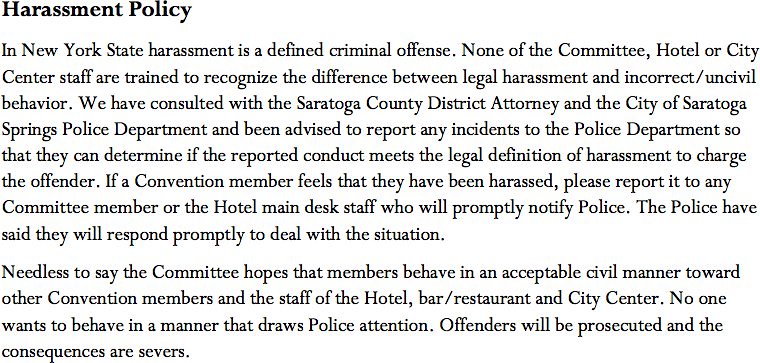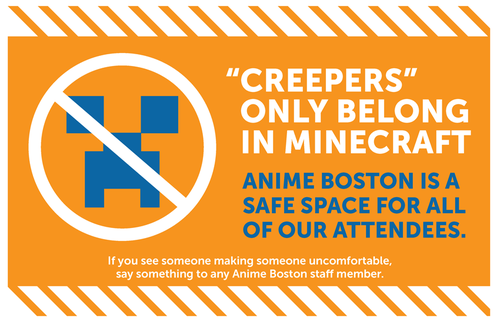#MeToo, Denial, and Backlash
Last month, published an article called Children’s Publishing Reckons with Sexual Harassment in Its Ranks. The conversation and discussion will be familiar to many. When I checked, there were 475 comments, many of which named and talked about known harassers in children’s publishing and elsewhere.
Last week, author Anne Ursu published the results of a survey she’d done, along with a great deal of discussion and analysis, in Sexual Harassment in the Children’s Book Industry.
We’ve had similar conversations in the SF/F genre, and we’re seeing it in society in general. Sexual harassment isn’t limited to any one region or profession. If you think your field is immune, you should probably brace yourself for an unpleasant reality check coming your way soon.
As always, there’s been backlash. People — mostly men, from what I’ve observed — protest that #MeToo is turning into a witch hunt. “We all want to support real victims and punish real harassers, but what about all the innocent people whose lives and reputations are being ruined?”
Others worry about due process and false accusations. (Pathetically, the most recent false accusations I’ve seen came from trolls who complained about how easy it is to make a false accusation, and tried to prove it by making false accusations. Which…WTF, dude?)
Then there’s that sense of overwhelming disbelief. “I know harassment happens, but it can’t possibly be this big a problem, can it?”
Yeah, it can.
Statistics
- The Equal Employment Opportunity Commission’s Select Task Force on the Study of Harassment in the Workplace found that “anywhere from 25% to 85% of women report having experienced sexual harassment in the workplace.” In other words, depending on the study and how the question was asked, a minimum of 1 in 4 women had been sexually harassed at work.
- ABC News last year found, “about 33 million U.S. women being sexually harassed, and 14 million sexually abused, in work-related incidents.”
- A study of employed women by Potter and Banyard in 2011 found, “38% had experienced sexual harassment in the workplace.”
Study after study shows that sexual harassment, particularly (but not exclusively) of women, is common. Millions of victims in the U.S. alone. And for so damned long, companies have swept these incidents under the rug and created ridiculous hoops to discourage victims from reporting.
These two factors — the frequency of harassment and the backlog of unreported or silenced incidences going back longer than we’ve been alive — explain why we’re now seeing so many people coming forward. We’re dealing with one hell of a backlog. It’s why we’re going to see a hell of a lot more of these stories, now that the dam is beginning to crack.
It is overwhelming, especially if you’ve had the luxury of not seeing it. As a guy, I’ve rarely been directly affected by sexual harassment. I had the ability to close my eyes and get on with my life. Not anymore. And that’s a good thing. It means everyone has to face the facts — facts we’ve known about from study after study after study.
This flood is what the data has been telling us all along.
What About False Accusations and Due Process?
Employers, conventions, and other organizations need to have good harassment policies in place, and they need to follow those policies.
An individual who chooses to speak out about being harassed is not a company. They aren’t the judicial system. They’re an individual who has every right to disclose what a predator did to them.
We know false accusations of sexual assault or domestic violence are rare — just like false accusations of other crimes. I’ve not found reliable research on false accusations of sexual harassment, specifically. But in general, hysteria over the idea of women destroying men’s lives with false accusations has drastically overshadowed the reality.
There’s a proven epidemic of sexual harassment. There is absolutely no evidence for an epidemic of false accusations.
Yes, it happens. We had the false accuser of Roy Moore last year who inadvertently proved how good the Washington Post was at investigating and substantiating such accusations. There’s a notorious SF/F troll who likes to accuse a bestselling author of being a rapist, based on the troll’s inability to understand satire. There’s the case of Jemma Beale, who was jailed for 10 years for making false accusations of rape. And one individual in the comments of the article has said they made up an accusation about two men. (As of 2/14 at 5 p.m., the admins have not verified this is the same commenter who made the accusation.)
It’s not that false accusations never happen. It’s that they’re rare. But time and again, the overblown hysteria over false accusations is used to derail and drown out discussion of the demonstrably real flood of sexual assault and harassment.
Does “Believe women” mean women never ever lie and there’s no such thing as a false accusation? Of course not. What it means is that if someone says they were sexually harassed, the odds are extremely good that they’re telling the truth. (And those odds increase exponentially when multiple victims come forward.)
If a sexual harassment case goes to human resources or the judicial system, there should be a process to be followed. (Preferably a process that doesn’t actively punish victims for reporting.) I haven’t seen anyone suggest otherwise.
I’m neither a business nor a court. And I believe the victims.
But That Person Has Always Been Cool Around Me!
It’s hard to see someone you know named as a harasser. I’ve been there. I felt the instinctive shock and denial. I automatically thought back to my own interactions with the person, and I couldn’t remember anything inappropriate.
I had a similar reaction when I learned a friend at the crisis center where I volunteered had embezzled roughly $13,000 from the organization. I couldn’t believe it. He’d always been a kind, friendly, generally awesome guy. I’d never seen anything to suggest he was a thief.
But maybe that was because he didn’t march around stealing money in front of me!
It’s the same damn thing with harassers. They’re not running around harassing everyone who crosses their path. Predators choose and isolate their targets. They test boundaries. They use guilt and manipulation, and they make you question yourself. They get their victims into a situation where they can harass them without witnesses.
They also build relationships with people who’ll vouch for them. They don’t just groom potential victims; they also groom potential character witnesses. Harassers and abusers can be incredibly charming. They can do genuinely good things in other areas. You might like and trust them.
But saying, “All of my interactions with Bob have been great!” does nothing to address the accusation that Bob sexually harassed people. All you’re doing is saying he didn’t sexually harass you. Which is great, but not really relevant.
Let’s see how that conversation would look in a different context.
- Jill: “Fred murdered my grandfather.”
- Jack: “Well, Fred never murdered either of my grandfathers!”
- Jill: “WTF is wrong with you, Jack?”
It’s a little exaggerated, I know, but hopefully you get the point?
This Is Only the Beginning
Sexual harassment is built on generations of inequity. It’s been going on for centuries. It’s not going to go away overnight. This is a long-term, systemic problem, and it’s going to need long-term work to try to fix it.
I get how disheartening it is. I’ve hated seeing people I respected and admired outed as serial harassers or worse. (I’m still pissed and grieving over Bill Cosby.)
You know what I hate even more? That their behavior was allowed to continue for so long. That so many women and men suffered because the rest of us looked away or refused to listen. That the careers and lives of so many victims were derailed.
However painful it might be to me to read these stories, it’s nothing compared to the pain of everyone who lived them. However tired I might feel, it’s nothing compared to the exhaustion of those on the front lines, fighting — demanding to be heard. Demanding change.
It takes tremendous courage to speak out about being sexually harassed. The least the rest of us can do is find the courage to listen, and to accept the reality of a problem we might not want to face.
Mirrored from Jim C. Hines.






